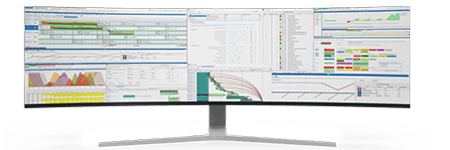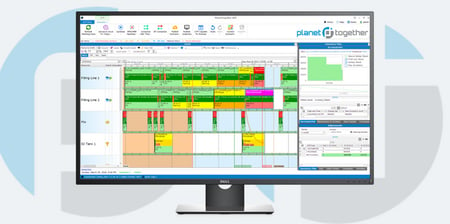Reevaluating the Pharmaceutical Supply Chain
Reevaluating the supply chain isn't merely a periodic activity—it’s essential for sustaining success in a constantly evolving landscape in pharmaceutical manufacturing industry. Increasing global competition, the need for rapid scalability, fluctuating demand, and stringent regulatory pressures mean that Operations Directors must think critically about their supply chains.
Leveraging advanced planning and scheduling (APS) tools like PlanetTogether, integrated with robust systems such as SAP, Oracle, Microsoft, Kinaxis, or Aveva, can provide significant competitive advantages.

The Case for Reevaluating the Pharmaceutical Supply Chain
A well-optimized pharmaceutical supply chain isn't just about efficiency; it directly impacts patient outcomes. However, the industry faces unique challenges:
Regulatory Complexity: Stringent regulations governing every phase from raw material procurement to product distribution mean the slightest misstep can have dire legal, financial, and reputational consequences.
Unpredictable Demand: With fluctuating demand for certain medications, driven by seasonal illnesses, emergencies, or pandemics, maintaining optimal inventory levels is challenging.
Supply Chain Risks: Global supply disruptions, transportation bottlenecks, and vulnerabilities exposed during crises such as COVID-19 underscore the need for agility.
These challenges call for a robust, transparent, and integrated approach to supply chain management, allowing Operations Directors to keep pace with these dynamic demands.

Key Areas for Reevaluation Supply Chain in Pharmaceutical Manufacturing.
Demand Forecasting and Planning
Pharmaceutical demand forecasting is notoriously challenging, given the complex and often unpredictable nature of healthcare needs. With a solution like PlanetTogether APS integrated with ERP systems (e.g., SAP or Oracle), companies can leverage real-time data to better understand patterns and plan accordingly.
Real-Time Data for Accurate Forecasting: Integrating PlanetTogether with ERP systems allows you to capture demand signals, inventory levels, and order statuses in real-time, refining forecast accuracy.
Scenario Planning: A critical aspect of reevaluation is "what-if" scenario analysis. Advanced tools enable teams to simulate various supply chain scenarios, aiding in preparation for demand spikes or drops.
Production Scheduling and Capacity Utilization
Maximizing production efficiency is crucial in pharmaceuticals, where downtime can mean missed deadlines and delayed shipments. PlanetTogether, when paired with systems like Microsoft Dynamics or SAP, can provide visibility into real-time production data, helping directors optimize capacity utilization and reduce waste.
Enhanced Scheduling Precision: With PlanetTogether’s APS capabilities, pharmaceutical manufacturers can dynamically adjust production schedules, taking machine availability, labor shifts, and material delays into account. Integration with ERP solutions keeps scheduling synced with demand, optimizing batch production and reducing idle time.
Capacity Planning: Operations Directors can leverage the integrated systems to analyze available resources and adjust as necessary. By adjusting capacity allocation across multiple sites and equipment, supply chains can be adapted to meet varying levels of demand efficiently.
Inventory and Waste Management
Managing inventory effectively is essential for pharmaceutical manufacturers, where both shortages and surpluses carry significant risks. Integrating PlanetTogether with Kinaxis or Aveva can transform inventory management by providing end-to-end visibility, thereby reducing the costs associated with overstocking, spoilage, and waste.
Optimized Inventory Levels: Through integration, companies gain insight into stock levels, material usage rates, and expiration dates, enabling them to keep inventory levels balanced. This balance is crucial for minimizing waste, especially for perishable raw materials.
Automated Replenishment: Integrated systems can trigger automated reorder processes based on real-time inventory data, ensuring optimal stock levels without manual intervention. Automated notifications can also alert teams to approaching expiration dates, helping to prevent costly waste.
Supplier Management and Collaboration
Pharmaceutical manufacturing relies heavily on a network of suppliers. Reevaluating supplier relationships and using tools like PlanetTogether integrated with SAP or Oracle can streamline collaboration and reduce the risks associated with supplier dependencies.
Supplier Performance Monitoring: Integrated platforms can track supplier performance metrics like lead times, quality standards, and on-time delivery. With these insights, Operations Directors can make data-driven decisions about which suppliers to rely on and when to explore alternative sources.
Risk Mitigation: By centralizing supplier data and connecting it with demand planning, companies can identify potential disruptions early on. For instance, if a supplier is known for frequent delays, the system can flag potential risks to ensure backup plans are in place.
Regulatory Compliance and Traceability
Regulatory compliance is non-negotiable in the pharmaceutical industry. Integrated systems with PlanetTogether enable a seamless exchange of data, making compliance monitoring more manageable and transparent.
Real-Time Data Logging: When data from PlanetTogether feeds directly into ERP solutions, companies gain a full audit trail of every batch, helping track compliance across the production and supply chain stages.
Regulatory Reporting: With an integrated APS and ERP system, generating reports for regulatory bodies is streamlined, allowing for faster responses to compliance audits. The ability to provide precise and accessible information minimizes the risk of compliance lapses.
![]()

The Role of Integrated Systems in the Reevaluation Process
By integrating APS software like PlanetTogether with ERP solutions (e.g., SAP, Oracle, Microsoft, Kinaxis, or Aveva), Operations Directors can access a holistic view of the supply chain. Here’s how these integrated systems play a vital role in reevaluation:
Data Unification: Integrated platforms aggregate data across production, inventory, demand, and suppliers. This consolidated view facilitates better decision-making and reduces the likelihood of errors.
Improved Collaboration: With a centralized system, cross-functional teams have access to shared information, improving collaboration between production, purchasing, quality control, and logistics.
End-to-End Visibility: Integrated systems provide an end-to-end view, allowing Operations Directors to quickly identify bottlenecks, monitor KPIs, and optimize each link in the supply chain.
Agility and Responsiveness: By connecting APS and ERP solutions, pharmaceutical companies can respond to changes in real-time, adjusting plans, inventory, and scheduling without significant disruptions.

The Benefits of Reevaluation and Integration
For Operations Directors, reevaluating the supply chain and implementing an integrated APS-ERP solution offers several advantages:
Enhanced Efficiency: Automating scheduling, inventory, and supplier management minimizes manual tasks, reducing delays and operational inefficiencies.
Reduced Costs: Optimized inventory levels and efficient production scheduling lower carrying costs, waste, and spoilage.
Agility in Demand Management: With accurate demand forecasting and flexible scheduling, companies can better meet sudden demand changes.
Improved Compliance: Streamlined data tracking and reporting simplify compliance with stringent pharmaceutical regulations, reducing compliance-related risks.
Sustainability: By minimizing waste and optimizing resources, integrated systems contribute to sustainability goals—a growing priority in the industry.

Implementing an Integrated Solution: Best Practices
Start with a Clear Goal: Define specific supply chain goals for the reevaluation process, such as reducing lead times, cutting costs, or increasing production flexibility.
Assess the Current System: Evaluate current systems and processes to identify areas of improvement. Where are the bottlenecks, and how can integration alleviate them?
Ensure Compatibility: Choose an APS that integrates seamlessly with your existing ERP. Compatibility is essential for achieving a unified data flow across the supply chain.
Provide Training: For maximum effectiveness, train your team on the capabilities of the integrated system. Teams should know how to use data insights for improved decision-making.
Monitor KPIs Post-Integration: Track key performance indicators (KPIs) after implementing the new solution. These metrics can include on-time delivery rates, inventory turnover, and production downtime.
The pharmaceutical supply chain demands meticulous planning, regulatory adherence, and operational resilience. By integrating PlanetTogether with ERP solutions like SAP, Oracle, Microsoft, Kinaxis, or Aveva, Operations Directors can unlock the full potential of their supply chains. With enhanced visibility, optimized inventory, and efficient production scheduling, pharmaceutical manufacturers can meet fluctuating demand, maintain regulatory compliance, and reduce waste—ultimately positioning themselves as leaders in an industry where precision is essential.
In an era marked by uncertainty and rapid change, reevaluating the supply chain isn’t just advisable—it’s essential. With an integrated APS and ERP solution, pharmaceutical manufacturers can achieve the agility, efficiency, and resilience needed to thrive in a complex landscape. For Operations Directors, the opportunity is clear: leverage the power of integration and advanced planning to build a more responsive and future-ready supply chain.
Are you ready to take your manufacturing operations to the next level? Contact us today to learn more about how PlanetTogether can help you achieve your goals and drive success in your industry.
Topics: PlanetTogether Software, Integrating PlanetTogether, Regulatory Compliance and Traceability, Demand Forecasting and Planning, Pharmaceutical Manufacturing, Production Scheduling and Capacity Utilization, Inventory and Waste Management, Supplier Management and Collaboration





















LEAVE A COMMENT